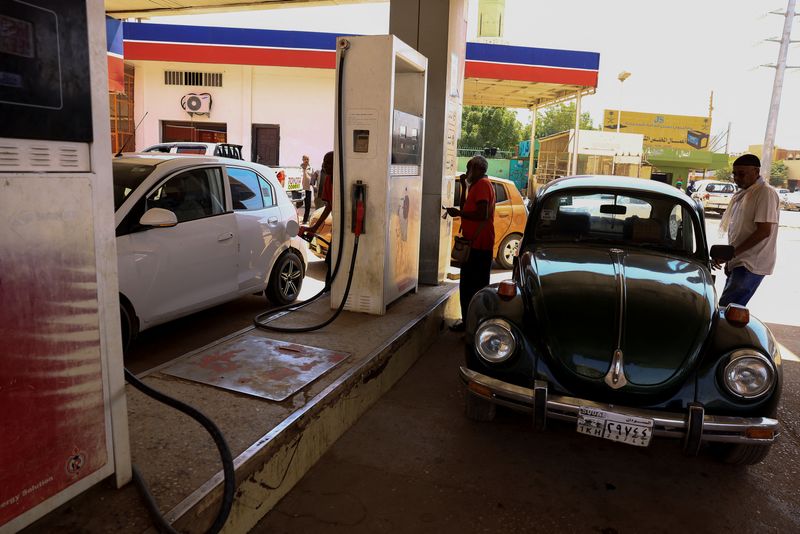Sudan’s economy tumbles in post-coup deadlock By Reuters

© Reuters. Cars are seen at fuel station in Khartoum, Sudan February 28, 2022. REUTERS/Mohamed Nureldin Abdallah
2/2
By Khalid Abdelaziz, Nafisa Eltahir and Aidan Lewis
KHARTOUM (Reuters) – Sudan is once again lurching towards economic collapse in the aftermath of a coup in October, with exports plummeting more than 85% in January according to central bank data and the currency sliding on the black market.
Cut off from billions in foreign assistance, a military-led government is raising prices and taxes on everything from healthcare to cooking gas, but the increases have angered struggling citizens.
Sudan’s long-running economic crisis – a legacy of decades of war, isolation, and sanctions – had shown signs of abating before the coup, but now poses a fresh humanitarian risk as its population faces renewed violence and rising levels of hunger.
Military leaders have yet to name a prime minister and protests have raged for months. The political deadlock is paralysing business, said Amin Shibeika, a Khartoum banker.
“No one is making future plans, it’s all suspended. There’s a lack of transparency, with no light at the end of the tunnel,” he said.
The Oct. 25 coup ended a power-sharing agreement between the military and civilians struck after the overthrow of former leader Omar al-Bashir in a 2019 uprising. Designed to lead to democratic elections, it had seen a civilian government implement painful economic reforms and secure foreign assistance and debt relief. That is now frozen.
In the latest effort by the leadership to rally scarce international support, Mohamed Hamdan Dagalo, deputy leader of Sudan’s ruling council and commander of the paramilitary Rapid Support Forces, travelled to Moscow last week accompanied by finance minister and armed group leader Jibril Ibrahim.
While the delegation met senior figures including Foreign Minister Sergei Lavrov, no major deals have been announced and Russia itself is now facing sweeping Western sanctions over the invasion of Ukraine.
NO BAILOUT IN SIGHT
A senior Sudanese official said the government saw no foreign bailout on the horizon, and Ibrahim has said Sudan would rely on its own resources for this year’s budget.
According to a copy of the draft budget seen by Reuters, it is aiming for a 145% increase in tax revenues and a 140% increase in revenue from the sale of commodities and services.
Among the tax measures to achieve that is what traders say is a four- or five-fold increase on annual business licence fees. But businesses are so used to not paying taxes that increases would be hard to impose, said Shibeika, the banker.
“Business has basically stopped in the last few months, so these are additional burdens in difficult circumstances,” said a business owner in central Khartoum. “This is the worst its been since I started trading 20 years ago.”
Revenues and spending are forecast to rise by more than a third, with a deficit of 363 billion Sudanese pounds ($820 million).
Though the…
Read More: Sudan’s economy tumbles in post-coup deadlock By Reuters
